As a way of honoring the great Barnard Hughes, who died today in Manhattan at age 90, please listen to this sound file of a confession he delivers in Arthur Hiller and Paddy Chayefsky’s The Hospital (1971)…a confession about having killed three staffers in a New York hospital, but not by his own hand…not precisely…he merely arranged for the three to need urgent medical attention, and then put them under the care of the hospital’s general staff, thus ensuring their deaths.
Lunar Pages strikes again
HE readers may have noticed over the past several hours that the software allowing comments to be posted at the tail end of each item or article has been disabled. This is the intended deliberate doing of Lunar Pages, HE’s web server out of La Habra, California. Of course, they didn’t think to notify me of the problem (whatever it is) by e-mail as it happened. Naturally I’ve written them about this problem and marked it “triple urgent”, but they sometimes take 24 to 48 hours to respond to e-mails. And of course, they don’t have anyone answering phones at their office after 5 pm Pacific. I don’t have a dedicated line with Lunar Pages, which is the biggest and most secure server they offer, but I pay a somewhat sizable fee for the largest shared server plan you can get from them. All I can tell you is, they’re not reliable and when things go wrong they are always slow as molasses to respond.
“Enemies” and Vaughn
Columbia Pictures hasn’t yet put an offer on the table for Vince Vaughn to play heroic FBI guy John O’Neill in Paul Haggis ‘s film version of Against All Enemies, but Vaughn has been reportedly been talking to Haggis about doing it. And a story about this not yet solidified situation was fed to the Hollywood Reporter for what purpose, and with what motive? Vaughn’s O’Neill is a likable supporting character — a good hombre who gets the terrorism picture as clearly as the hero, Richard Clarke (who will apparently beplayed by Sean Penn) does. I’ve read a draft of the script as it existed before Haggis began his “supervisory” rewrite with original screenwriter James Vanderbilt, and I ran a review of it on 3.20, and I can tell you that O’Neill turns up on page 67 and exits on page 123. Tatiana Siegel‘s THR piece says no offer has been made to Vaughn because Columbia Pictures is “fine-tuning the film’s budget.” What is that, a euphemism for “hemming and hawing”, as in “this project scares us…we’re not sure what we should do…if it fails it’ll reflect badly on us…should we wait and see what World Trade Center makes the first weekend before we greenlight it?”
Friedman on “WTC”
Fox 411’s Roger Friedman has seen Oliver Stone‘s World Trade Center (Paramout, 8.9) and is calling it “an elegant, powerful, moving and genuinely personal document about the horrors that happened inside and outside of the World Trade Center.” He also says that “because of its scope, [it’s] grander than United 93 and perhaps has some loftier cinematic aspirations. And as much as it’s all about the real men and women whose acts of courage nearly got them killed that day, World Trade Center is nonetheless an Oliver Stone film through and through.”
N.Y. Journo Disses “WTC”
But hold on…Mr. Manhattan (i.e., a guy I know and trust) has also seen World Trade Center and he’s not doing cartwheels like Friedman is.
“It’s easily the most traditionally-shot film Stone has made in some time…no insane jump-cut editing, no bleached film stock,” he begins. “But it’s dull. The basic problem is that the two protagonists — Port Authority policemen trapped in the rubble of the fallen towers — are immobile for most of the film, which isn’t exactly cinematic.
“Stone manages to give a fair sense of their terror and claustrophia, but he’s also decided to make the middle of the film very schematic, cutting back and forth between the buried cops talking to each other, and then to their desperate families trying to get news of their whereabouts. It’s not that intrinsically interesting, and borders on outright soap at times.
“The film only really picks up in the last third, with the rescue efforts, which are pretty detailed and excruciating. There’s also an interesting subplot about an office worker in Connecticut, a former Marine, who puts on his military duds, bluffs his way onto Ground Zero, and is instrumental in rescuing the cops.
“But there are also some unintentional howlers. A short sequence in which one of the parched officers hallucinates Jesus offering him a bottle of water will definitely elicit embarrassed laughter from any audience.
“And a very minor subplot about some Wisconsin firefighters who volunteer their services has you wondering: why these guys? Hundreds of rescue workers came from all over the country. Why pick these guys if they didn’t do anything special? (The only thing they’re shown doing is handing out bratwurst to the rescue workers.)
“The film is sincerely made, well acted, and there’s definitely some emotional catharsis at the end, but Greengrass’ United 93 is far, far better, for, I think, two reasons: the semi-doc style makes it very immediate; and most of United 93 is about how a variety of people and agencies reacted to the day’s events. This macro view seems to checkmate World Trade Center‘s micro viewpoint at every turn.
Downshifting C.W. Prods
There’s qualifying, there’s hedging and then there’s cotton-balling, and it seems like Variety‘s Nicole LaPorte and Chris Gardner went for option #3 when they used the word “may” in their story about Paramount deciding whether or not to renew its deal with Cruise-Wagner Prods. If Par re-ups with C/W, they said, the deal “may not come with the same points as it did before.” Everyone knows C/W is a devalued entity due to the antics of Nutter Tom, despite his highly respected and shrewd partner Paula Wagner. Nothing personal — it’s the money. For a guy whose aura is in the process of imploding , which resulte in M:I:3 only making $132,556,364 million domestic, and for a company that produced the unsuccessful Elizabethtown and Ask the Dust (both of which should have worked — I read both scripts a couple of years ago and was convinced both were at least semi-golden), C/W Prods. simply costs too much. So from the perspective of Paramount honcho Brad Grey, the negotiating slogan is probably something alone the lines of “take a markdown or find another home, guys.”
Nice Vice
Michael Mann‘s movies are so good and so Rolls Royce that when a new one comes up 8, it’s an easy 9.5 or 10 by everyone else’s standards. If you know his stuff, you know what I’m saying is true. I’m not using the Rolls Royce analogy casually. The elation I felt yesterday from Miami Vice (Universal, 7.28) wasn’t just about tromp-down speed or engineering or a perfectly-tuned engine — that’s standard content in any Mann film. And it wasn’t quite about the sadness and the soul, which is in this film but not in the abundant qualities found in Heat and Collateral and The Insider.
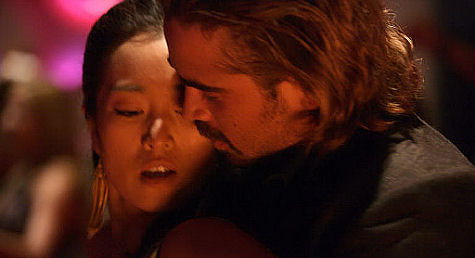
I’m talking about the fumes. The fumes of Miami Vice — the aroma, the grit, the atmospheric stuff, the digital flavor of Dion Beebe’s here-and-there photography — are superb (and sometimes in a realm so special I can’t quite describe it), and this alone makes it the supreme commercial “ride” movie of the summer.
By this I mean my kind of two-hour popcorn movie…an exquisitely configured, not-too-taxing thing for people who are smarter, hipper and more seasoned than the mainstream squealies who went nuts for Pirates 2. It sounds elitist to say this, but…
I’m talking about a crime movie that just roars in and does the job, but lingers on with so many different little moods and tones and accents and side-excursions that, like all first-rate films, it’s clearly up to a lot more than just “story” (and the more I write about movies the less I know what that term really means).
I was never that much into Mann’s Miami Vice back in the mid ’80s, so I wasn’t sitting there yesterday afternoon going “this is new” or “that’s cooler”. Forget Don Johnson and the other guy whose name I’ve never been able to remember, and who I’d rather not look up on the IMDB because that will somehow kill the mood.
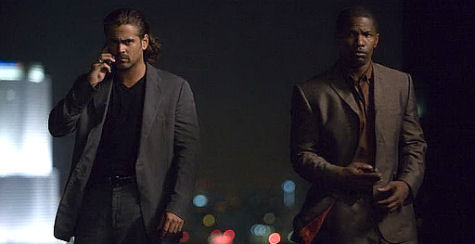
Miami Vice is right table-slam now…a combination of big expense (Universal is copping to $135 million), sweat-zone cool and wow photography, all focused on a kind of saxophone-solo story about a couple of Miami detectives looking to burn some very serious drug dealers by way of an undercover operation — a piece of elaborate theatre in which the cops pretend to be bad guys.
The way it’s been shot and cut is mainly about set-up for the first half (or do I mean two-thirds?)…mutterings, maybes, sex, whispers, half-understood’s and the radiant Gong Li, who is back at the top of the list of all-time hotties with this film — and then Big Payoffs happen during the last 30% or 35%.
Colin Farrell’s blonde hair in this film is much better — greasier, more lived in, more in synch with his age and his Irish-ness — than it was in Oliver Stone’s Alexander . Sounds like a mundane nonsequitur, but sometimes the authority of movies can be measured by such things.
Drink a strong cappucino and be well rested before you see this thing — you’ll need to pay close attention. All good movies are calibrated to stay a wee bit in front of what you think you know is going on — if this isn’t done boredom sets in. But my feeling during the first half (and I’m describing this with respect) was along the lines of “whoa, wait a minute…what’d he say? Is this Haiti or…? Rewind those last two lines…oh, I get it…well, most of it.”
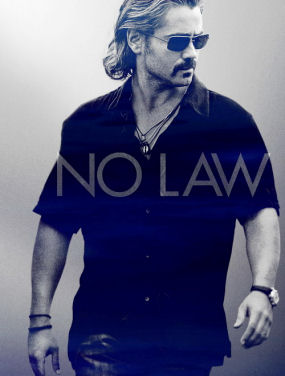
Beebe’s photography (like Collateral, most of Vice was shot with a Thomson Viper) is, as you may expect, nervy as shit — at times conventionally appealing, at times “pushed” and flecked with grain, but always sensual and photochemically “real” in a way that never stops being exciting or enticing in some “off” way.
Who, exactly, are Farrell’s Sonny Crockett and Jamie Foxx’s Ricardo Tubbs? Foxx/Tubbs seems like a relatively at-ease guy in love with his lady (Naomie Harris) but Farrell/Crockett is the kind of guy who doesn’t know what kind of guy he is outside of the rush of the job.
That’s what makes his falling in love with Gong Li’s Isabella, the girlfriend of big-time drug lord named Arcangel de Jesus Montoya (played by Luis Tosar, a balding, bearded guy with the most piercing eyes I’ve seen anywhere in a long time), so I-don’t-know-what…odd, surprising, curious, unexpected. A man in the grip of something that won’t let go and is about a lot more than tumescence.
There’s a big heartbreak factor that comes out of the Farrell-Gong relationship at the finale, but let’s be honest and admit it’s not as emotionally touching as Tom Cruise‘s Vincent asking Jamie Foxx if anyone will notice his body sitting on an L.A. Blue Line train in Collateral, and it’s not as touching as Al Pacino holding the dying Robert De Niro’s hand at the end of Heat. That’s one reason why this movie is an 8 on the Mann scale.
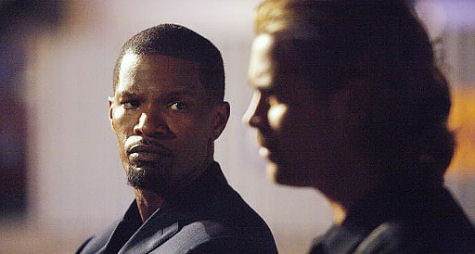
The sex scenes (Farrell/Gong’s in particular) have deep-down currents of feeling and longing that other directors wish for before they’re about to shoot their own. Dear God, let me find something between my actors that will make the audience forget the carnality, or at least put it into some kind of spiritual perspective.
All Mann movies are beautifully acted, and each and every supporting Vice actor, no surprise, is a stand-out. The big bad guys (Tosar, John Ortiz) are fearsome. Ciarin Hinds is playing a dullard but it’s good to experience him nonetheless. Barry Shabaka Henley, the jazz-club owner who got shot in the forehead twice by Cruise in Collateral, is good as an upper-level Miami cop. John Hawkes, an anemic-look- ing actor with a scuzzy goatee and an aura of insufficiency, portrays a low-level criminal during the opening few minutes. Domenick Lombardozzi (Find Me Gulity, Entourage) is very fine as another cop.
But please, please see this film for Gong Li, if for no other reason than it will help you forget how poorly she was used as the wicked bitch in Memoirs of a Geisha. This is one of the sexiest and most soulful performances by an actress in any medium in a very long time. I couldn’t quite understand everything she said, to be perfectly honest (her accent is a problem), but ooh, mama, the stuff she exudes during her scenes with Farrell.
I don’t want to get into the story any more than I have. It’s a film about lying — selling them, discovering them and the heavy cost and the smell of them.
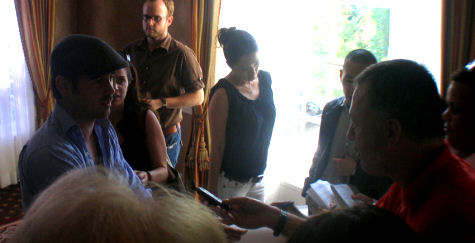
I’m going to let this go and see Vice again on Thursday and get into it a bit more on Friday, but no one can watch this film and feel burned. The people who’ve been whispering about this film not being the thing that it could have been haven’t seen it, not really. They haven’t let it in. Or they’re just being hard-assed.
Like I said, the highlight of the set-up, exposition, planning, and planting-the-seeds portion, which is something like 65% to 70%, is the romantic white-water ride taken by Farrell and Gong. I imagine there may be some who will feel a bit lost or uncertain in terms of what’s actually going down at this or that point. I did at times, but there’s something to be said every so often for the feeling of “not knowing.”
Howard Hawks says…
A plaque hanging just outside of one of the mixing studios inside the Howard Hawks stage on the 20th Century Fox lot — taken Monday, 7.10, 3:10 pm as myself and three other guys waited to see Miami Vice. My review will be up by late morning, but I can certainly reveal that Hawks’ wisdom has been found its way into the story and textures of this intensely instinctual film, by way of director-writer Michael Mann.
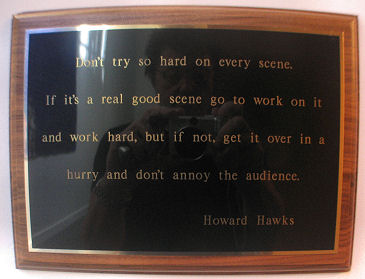
Poland on Bamberger/Shyamalan
I read this David Poland/Hot Button piece about Michael Bamberger‘s M. Night Shyamalan book late yesterday afternoon. It’s a solid, thorough and perceptive take on a fascinating, at times recklessly out-there confessional.
My differing view is that while the reactions have indeed been “a bit too harsh” so far, the value of the book — and the state of Shyamalan’s reputation — should not depend on whether or not Lady in the Water makes it as critical or commercial hit. Shyamalan’s bravery (even if you want to call it a form of manipulated spin) in allowing himself to be portrayed in such vulnerable, emotionally fragile terms deserves respect.
I said a day or two ago it’ll be no tragedy if Lady in the Water ‘s reception (we’ll know this story soon enough) forces him to become a lower-budget art-house director or go the director-for-hire route…no tragedy at all. The man has to free himself from the Sixth Sense penitentiary he’s been living in these last few years; maybe deep down this is the way he’s decided to accomplish that.
“Dupree” ad
You, Me and Dupree (Universal, 7.14) may or not be “the funniest movie of the summer” (here’s what the Hollywood Reporter ‘s Kirk Honeycutt and Variety‘s Justin Chang have to say), but I need to strenously argue with Mark S. Allen‘s assertion that it’s “relentlessly honest.” I’ll explain why in a day or two.

Word on “Water”
“I’d go easy on the sympathy angle for Night,” a guy has advised me. “I’ve seen Lady in the Water and it’s an utterly fascinating portrait of a man’s fragile, out-of-control ego. As a story, it’s worthless. As a director, Night used to be able to create a sense of apprehension with the best of them. Now, he can’t even summon that.” Hold up…I didn’t say anything about the film, or my support or sympathy for it. I said I respect Michael Bamberger‘s book about Night, and Night’s courage in exposing himself so nakedly. “[Disney chief] Nina Jacobson nailed everything wrong with the movie and Night did nothing to fix it,” my correspondent continues. “When you cast yourself as a writer whose ‘great thoughts’ will be ‘the seeds of change,’ that a young man will hear these great thoughts and become president and lead a great reform, then you are setting yourself up for ridicule. And when you make the movie’s bad guy a film critic, a man who would be ‘so arrogant as to assume the intent of others,’ you are setting yourself up for a stake-burning. But then, he will be able to delude himself that the critics have it out for them because he dared to agitate them. And I say all this as someone who wanted to like the movie. God knows Hollywood needs original voices telling original stories. But, clearly, Night needs to listen to other voices besides the ones rattling around in his head.”
Mann “Vice” Buzz
N.Y. Daily News columnist Lloyd Grove has been hearing about Miami Vice director Michael Mann‘s “maddening post-production process — screening the film at least once a day, then obsessively adding and subtracting dialogue, pauses and even frames, then redoing all the changes.” Maddening? That’s what all perfectionists do when they create something they want to be “just so.” (That’s how I write when I’m doing a big piece.) Grove is also hearing this process is “a desperate effort to fix the unfixable.” That’s not what I’ve heard at all from a very bright guy who’s seen the film. We’ll all see soon enough. “All of us agree this is a brilliant movie from the first frame to the last — a great Michael Mann movie,” Universal co-chief Marc Shmuger told Grove in the same piece.

